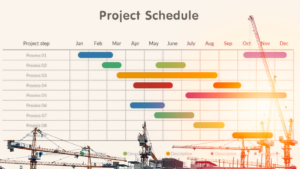General Contractor Key Responsibilities
Selecting the right general contractor (GC) for a project is crucial to ensure an efficient and successful construction project. A general contractor has many responsibilities on and off the construction site, including but not limited to – 
- Keeping the project on schedule: Creating and adhering to a timeline is essential for a successful construction project. Delays can cause effect all aspects of a construction project including material deliveries, worker schedules, and financials.
- Hiring and managing subcontractors: General contractors are also responsible for hiring and managing subcontractors. These subcontractors perform all or portions of the construction work (they are how stuff gets built). This can include anyone from the construction crew and carpenters to plumbing and electrical workers. If someone is working on a construction site, odds are they were hired by the GC.
- Material and equipment acquisition: Ensuring that the proper quality and quantity of material and necessary equipment arrive at the construction site on time also falls to the general contractor.
- Cost management: Financial management may also be the responsibility of the general contractor. This includes creating and providing cost estimates, setting the budget, and managing the costs of materials and labor.
- Safety: General contractors will also be expected to monitor and maintain onsite safety for all parties by managing OSHA compliance standards. Ensuring that the site is following regulations and guidelines is an essential part of overseeing a construction project.
- Monitoring quality: As the general contractor one will be expected to oversee the quality of both the materials used and the workmanship.
In summary, a lot relies on selecting the best general contractor. They organize, schedule, budget, the project and the people involved, all while ensuring safety, efficiency, and quality.
How to Choose a General Contractor
There are several steps one can take to make certain they are selecting a reliable general contractor such as defining the project, checking reviews and recommendations, obtaining a statement of qualifications, checking references, identifying and initiating contact with the communications coordinator, meeting the team, verifying insurances, looking into the company’s relationship within the construction community, asking question.
- Define the project: Before searching for a contractor, determine what kind of project you are hiring for. Some general contractors specialize in different areas, meaning the general contractor one hires for new construction may be different from the one hired for a renovation or addon project. Another part of defining a project is determining the budget, as knowing this from the beginning will aid both the client and the potential contractor.
- Check reviews and recommendations: Review and recommendations are an important part of the research process. Consulting online reviews or checking with the local home builders’ association as well as asking friends, family, and colleagues about their experiences can provide insight on the quality and efficiency of potential general contractors.
- Obtain a statement of qualifications: A statement of qualifications is like a more concise resume. It should include the most relevant experience, skills and capabilities, without all the extraneous information of a resume. This will provide the client with an overview of the contractor and what they’re able to handle for your project.
- Check references: Looking into a general contractor’s references will allow the client to assess the quality of work, uncover potential issues, and determine the contractor’s reliability and professionalism.
- Identify and establish a point of contact: Identifying and establishing a line of communication with a reliable and informed point of contact is critical to a successful and prosperous contractor-client relationship. The point of contact should handle all the client questions, updating the client on the progress of the development through each stage, and communicate closely with the client when there is anything that requires their direct involvement. This person will know the project inside and out.

- Meet the team: Just like establishing a point of contact, meeting the general contracting team is crucial. This will not only improve communication but allow the client to actually get to know the people that will be working with them.
- Verify insurance: Make sure any potential contractors have the necessary licenses and insurance to work in the area. Although general contractors working with the proper insurance and licensing is rare, it is still important to verify.
- Inquire about the company’s relationship with the construction community: A general contractor’s relationship with banks and subcontractors in the surrounding area can greatly affect the efficiency and quality of construction. This is because the general contractor is responsible for both hiring and managing the subcontractors as well as managing the project’s budget.
- Ask questions: Lastly, don’t be afraid to ask questions. Confusion and miscommunication can only hurt a project.
After General Contractor Selection
Once a trustworthy, quality general contractor has been selected there are still actions to be taken before they can break ground. First, the client must accept the general contractor’s bid (budget) which should be the total cost of building along with the contractor’s costs, overhead, and profit. Following bid acceptance, a well-written contract outlining the scope of work, budget, timeline, payment schedule, and any other details pertinent to the project should be drawn up, agreed upon, and signed by both parties. Then a schedule will be set, determining the project’s timeline. Finally, the home or site will be prepared and then construction can begin.






